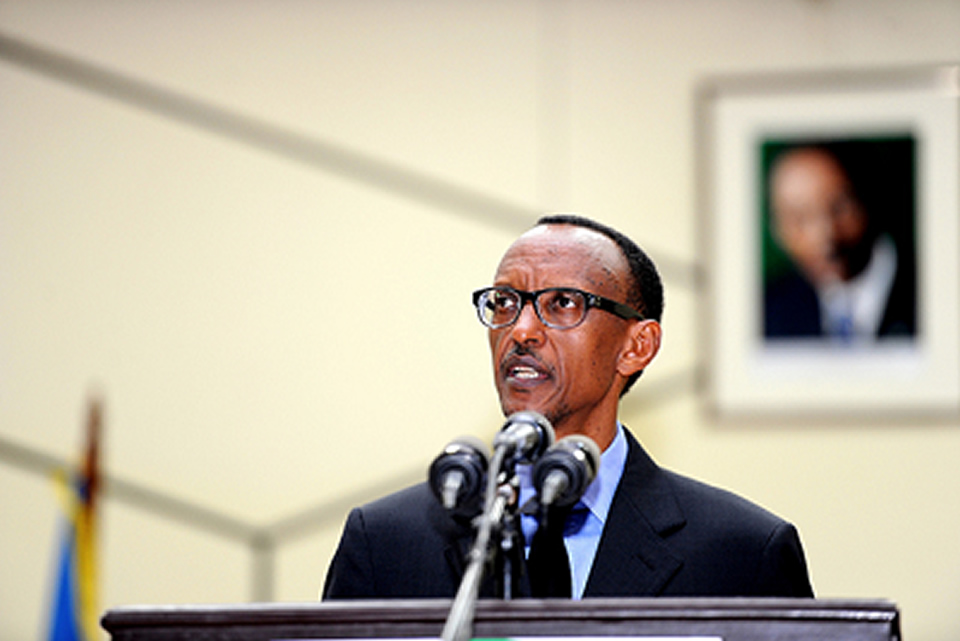Addressing the nation hours before 2012 ended, President Paul Kagame has called on all Rwandans to keep the development pace unmoved despite challenges that include recent aid cuts linked to the crisis in DR Congo.
“We are on the right path,” said Kagame in his annual State of the Nation Address. “What we need to do now is stay focused, work together and never get tired of developing our country and our people.”
“Even when faced with adversity. Challenges, in all their forms, should not make us weak. They should strengthen our determination to overcome. Let us show our resolve and commitment in this coming year of 2013.”
The Head of State made the comments while delivering his annual State of the Nation address from Parliament Grounds in Kimihurura in Kigali City, on the eve of the New Year.
With many expecting the President to once again focus on the on-going saga between Rwanda and the United Nations over the DR Congo crisis, President Kagame barely touched on the issue, instead eloquently painting a picture of prosperity, robust economic growth and national development for Rwanda as a country in the year 2012.
Kagame used a series of figures and numbers to display what has by and large been a very good year for the country, with substantial progress registered in virtually every sector of the country’s economy.
“One cannot shy away from mentioning that our country has continued to take steps forward in development, despite the rest of the world’s economy undergoing a recession,” the President said.
Kagame pointed out that the country’s economy on a whole grew by 7.7% this year, basing mainly on huge increments in the industry and services sector, which registered improvements in the region of 13.5% for the year, 6% coming in the first three quarters of the financial year.
He further stated that the robust economic growth has in turn reduced poverty levels in the country, with statistics revealing that over 1 million Rwandans have been liberated from the clutches of poverty in the last five years.
President Kagame attributed these considerable gains to Rwandans who have selflessly given their time and effort to ensure peace, security and enhanced service delivery throughout the country.
The President, in his State of the Nation address, also highlighted the impressive gains in the financial services sector, outlining that more banks have introduced their services in Rwanda, existing ones have opened even more branches and Savings and Savings and Credit Co-operatives, more commonly referred to as Saccos, have increased in number and continue to have an impact in the lives of their members.
The numbers paint a telling picture: there has been a 24% increase in the number of Rwandans accessing and using financial services such as banks and Saccos, from 48% in 2008 to 72% this year.
The total amount of money dispersed in loans – widely viewed by experts as a key indicator of economic growth – rose to Rwf 440 Billion, from Rwf 399 Billion last year.
Exports have increased a whopping 74% this year alone, but the adage ‘quality over quantity’ was also considered, with the quality of the products up 22%.
Imports also increased by 29%, quality control putting the gain in quality at 13.8%.
Here President Kagame noted that there remains a sizable disparity between revenue gained from exports and that spent on imports, calling on all Rwandans to put more effort still in increasing the productivity and revenues gleaned from the export sector.
President Kagame also revealed that investment in the country, be it from nationals, foreign-based nationals or foreigners, had also increased, totaling US$570 Million compared to US$483 Million in 2011.
Kagame said that these investments have mainly come in high-impact areas for the country’s economy, such as investment geared towards increasing output in the electricity and power sector, the building of international, five-star hotels and Rwandair, which helps connect Rwanda to the rest of the globe.
The President pointed out that these improvements have been facilitated for the most part by efforts by the government to facilitate and promote investment in the country.
“Let me remind you that our country is at the top in the region and third in Africa regarding facilitating investment.
New roads have been constructed, such as those connecting such as Kigali – Musanze; Kigali – Gatuna; Rusizi – Rubavu; Ntendezi – Huye; not to mention those that were rehabilitated. Town centers and their respective health centers were also improved, and accessibility to clean, safe drinking water and improved rollout of electricity to rural areas.
The mining sector also played its part in boosting the country’s economy.
“This year, the mining sector generated US$ 128 Million, with forecasts predicting increased growth in this sector.”
The President also singled out the tourism sector for best performance, saying that the sector was the leading generator of foreign currency in the country. the figures reveal this: US$ 232 Million generated this year, compared to US$ 204 Million last year.
“The main thing is that we as Rwandans continue to receive the visitors well, such that they leave with a good impression of the country and come back again, bringing along their friends and colleague.”
The President’s speech indicates his stance on the on-going furor over the continued chaos in the Democratic Republic of Congo, which Rwanda has been widely blamed and named chief culprit in the incident.
The President sought to focus the spotlight more on the tremendous progress Rwanda has achieved, which is nothing short of outstanding.
